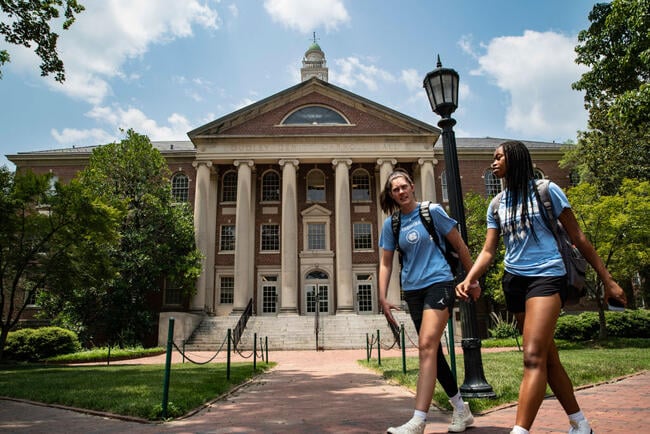You have /5 articles left.
Sign up for a free account or log in.

After delays that concerned faculty, the UNC Chapel Hill Board of Trustees has awarded tenure.
Eros Hoagland/Getty Images
The University of North Carolina at Chapel Hill Board of Trustees, after not publicly explaining why it hadn’t awarded tenure to faculty outside of health-related schools since 2025 began, granted tenure to 33 faculty members this week.
“The university administration and Board of Trustees moved these personnel actions forward given the impact the deferral caused on departments,” the university said in a statement. “The university will continue to weigh all factors when considering the timing of expenditures given the current fiscal environment.”
The now-tenured faculty are in the College of Arts and Sciences and the Schools of Education, Law and Information and Library Science.
After last month’s board meeting ended without action on these tenure cases, faculty went public with their concerns, saying the postponement was unusual, disrespectful and demoralizing. Media outlets began publishing stories on the confusing situation. But the board’s silence continued.
Finally, this week, trustees voted on tenure—by email. Their decision appears to end a flare-up in the continued national debate about the future of this higher education tradition, which conservatives have increasingly targeted. At least a couple of Chapel Hill trustees say they generally oppose tenure themselves.
Emails of the board’s discussion that were obtained by Inside Higher Ed shed light on the months-long delay and why some trustees were hesitant to approve the tenure awards. For instance, Trustee Jim Blaine wrote Monday that he wanted to wait until July to decide because he wanted an in-person discussion and more clarity on the university’s “fiscal picture.” He objected to any “immediate reversal of the decision that was recommended to us in closed session two weeks ago.” He further said he didn’t want to reward “bad behavior.”
“It is not good governance to give your child a cookie every time they lay on the floor and scream that they want one,” Blaine wrote. “The optics on this are terrible and make the administration look weak and irresolute. The reversal of course appears responsive to public groaning and gnashing of teeth—bad behavior by a few members of the faculty.”
Blaine added that he’d like “more information about who we are giving tenure to, how much demand there is for their classes, publications, and the majors they teach in, etc.” He also said that “regardless of my philosophical opposition to the outdated tenure model, I think we should proceed very cautiously and with full information before adding that kind of long-term, fixed cost.”
Trustee Marty Kotis also expressed concern in his own email over the long-term costs of tenuring professors given the university’s current financial situation. But Kotis has “consistently opposed tenure since 2014,” saying, “I find it difficult to believe university professors uniquely require lifetime job security comparable to positions held by the Pope or Federal Judges.”
Academic freedom advocates say tenure protects that right. But Kotis wrote that “we can preserve academic freedom through renewable contracts and robust performance reviews.”
Ritch Allison wrote to his fellow trustees, however, that the “bottom line for me is that the people on the slate did what was expected of them over an extended period of time under long-established rules. I just do not believe that we should change the rules on them at the final hour.”
“There is no doubt that this process has been flawed and going forward we need more information about where the administration wants to invest in tenure over the long-term,” Allison wrote, “but for me that is not a reason to upend the lives of the people on the slate.”
Adolfo Alvarez, another trustee and the student body president, wrote that he’s been hearing a “growing sense of uncertainty” from students.
“Tenure to them reflects the university’s long-standing commitment to academic freedom and to the faculty who shape their experience here,” Alvarez wrote. “While I might not see the full picture, I do wonder if there’s room to be more open to the UNC community about why some decisions are being held.”
Trustee Jen Lloyd requested a public discussion about the situation.
“Could we discuss the policy of tenure in open session (by Zoom) since the objections raised apply to tenure across the board, versus tenure grants specific to any of the personnel awaiting their decisions?” Lloyd wrote. She said she opposed “changing the rules abruptly for the cohort in front of us who followed the process in place at the time.”
Ralph Meekins Sr. also said he welcomes “an open discussion about tenure.”
“This email exchange is now a public discussion on the topic and email exchanges on a subject that is so important and critical to higher education is [sic] not the best forum,” Meekins wrote, adding, “I am against this aggressive approach. Our current faculty, our future faculty, and our students deserve better.”
Tenure, but not for Everyone
The delay of tenure awards at the prestigious public university added to national concerns about the future of this higher education tradition.
Tenured positions have been declining as a share of the professoriate for decades. The American Association of University Professors says about 68 percent of U.S. faculty outside of medical schools held what it calls contingent (ineligible for tenure) appointments as of fall 2023, compared to about 47 percent in 1987.
Currently, colleges and universities are facing financial pressures—including from the Trump administration’s research funding cuts—while Republican state lawmakers have been proposing legislation to weaken tenure. And some institutions are weakening tenure themselves.
Before this week, the Chapel Hill board, according to its website, had bestowed the honor and job protections tenure provides upon 32 faculty this calendar year. But, aside from Jed Atkins, the controversial dean of the School of Civic Life and Leadership, and Robert Hawkins, vice dean of the School of Social Work, they were all at the Schools of Medicine, Nursing, Pharmacy or Public Health.
Beth Moracco, chair of the Chapel Hill faculty, told Inside Higher Ed she’s probably received more calls, emails and other messages from faculty on the delayed tenure situation than any other issue in her two years as chair. And those couple of years have seen multiple other Chapel Hill controversies.
“This inaction, it reverberates much broader than just the faculty who are affected by the decision,” Moracco said Monday. She said it creates reputational damage that can harm retention and recruitment in the future.
‘Ongoing Uncertainty’
It’s still unclear why the majority of trustees held off on approving tenure decisions. Most didn’t respond to Inside Higher Ed’s requests for comment. Even Lloyd, a trustee herself, appeared not to know the board’s reasoning when she wrote her email.
“Could someone please share with the board the reason we did not vote on the deferred decisions at our regular May meeting?” Lloyd wrote.
Board chair John Preyer told Inside Higher Ed Tuesday that the board deferred action at the March meeting in order to get more clarity on the state budget and revenue losses from federal grants. He also said trustees “wanted to be responsible about new hires of lifetime employment.”
“It’s a tight budgetary year in North Carolina,” Preyer said. “So the concern was we should wait and see what the amount of money is coming from the state of North Carolina before we act on tenure, and it would be reasonable and responsible to get that information.”
In an emailed statement before the board approved the deferred tenure cases, the university had said the “exact timing of tenure awards is subject to a number of variables that our board of Trustees and administration may consider with any recommended appointments.” It further said that Chapel Hill “consistently reviews salaries and benefits to align offers with both our budget and current, relevant market data. Nothing has changed in the university’s tenure policies.”
Viji Sathy, a member of the Faculty Executive Committee, said during a committee meeting Monday that “this is not easy to come back from, and it makes people feel a lack of trust.”
“Going up for promotion or tenure, this is a really tense moment in a faculty member’s life, and to be in limbo for as long as they have been in is really— It’s not right,” Sathy said.
On May 23—the day after the Board of Trustees meeting ended without action on the tenure cases—interim provost Jim Dean outlined options for any new hires that were planned to join Chapel Hill with tenure.
Dean told Chapel Hill deans that the university was offering either a one-year, untenured appointment “that may be converted if tenure is later approved”—or a later start date on either Jan. 1 or July 1, 2026. It’s unclear how many faculty took up these alternative offers before the board finally approved the tenure cases, and whether they’ll also simply receive tenure now.
“I understand the stress this ongoing uncertainty places on affected faculty members and the schools and departments that support them,” Dean wrote. “Your continued partnership is vital, and I appreciate your efforts to provide reassurance and clear communication within your units.”
College of Arts and Sciences dean Jim White wrote last week to leaders in his college, telling them, “I know this situation has caused stress, frustration and confusion.”
Moracco said she had hoped the board would act before July 31 because there were faculty contracts ending June 30, at the end of the fiscal year, and faculty who were deciding whether to move to Chapel Hill.
Joy Renner, another member of the Faculty Executive Committee, said during Monday’s meeting that new hires are “very reticent about coming now.” And, she noted, current Chapel Hill tenure-track faculty have lost grants and are worried about the people they hired to work on those projects.
“They already have other things that are making them question if they can continue,” Renner said.




